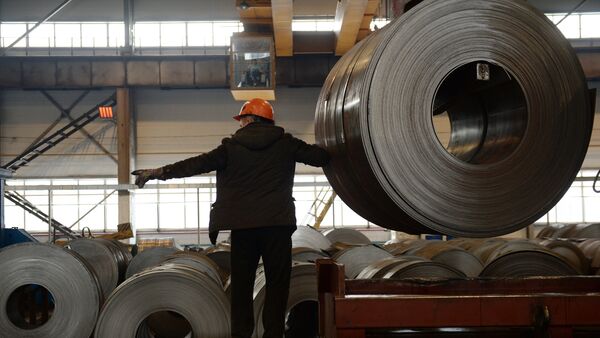MOSCOW (Sputnik) – According to the Russian Federal State Statistics Service (Rosstat), the Russian economy has grown by 2.5 percent in the second quarter of 2017 compared to the same period last year.
"I would say it adapted almost fully. If one looks back, it is clear that the sanctions did not have a particularly negative impact. We already had some issues, the sanctions forced us to look at some ‘slacking’ industries in a new way," Manturov said.
The Russian official added that the imposed restrictions had allowed the country's authorities to respond to existing challenges more effectively.
"We were forced to look for new mechanisms of financing, tools for support of the technological development. I think that we have succeeded in it. A lot of such promoting measures have… proved their efficiency. I do not like to make unsubstantiated statements, but the best thing to prove it are the figures. The share of Russian agricultural equipment has exceeded 50 percent for the first time in 20 years, and the overall production of medicines has increased by almost three times since 2009," Manturov said.
The minister added that at the same time, there were several difficulties caused by Western sanctions.
"Of course there are difficulties. There is no sense in denying that it would be much easier to make contracts and enter foreign markets with the support of local investors. Now we work not 'due to' but 'despite of' the sanctions and ruble exchange rate. However, the volume of domestic exports is growing," Manturov added.
Last week, United States President Donald Trump signed into law a bill imposing new sanctions against Russia, Iran and North Korea. Most notably, the law presumes sanctions against Russia's defense, intelligence, mining, shipping and railway industries and restricts dealings with Russian banks and energy companies.
The move punishes Moscow for its alleged meddling in the 2016 US presidential election, its alleged involvement in the situation in Ukraine, as well as its military activities in Syria. Russia has repeatedly denied the allegations.
The figure was included in the baseline forecast of the Ministry of Industry and Trade. According to the ministry, industrial production growth will amount to 2.1 percent in 2018 and 2019, and to 2 percent in 2020.
“I do not see any reason to revise the forecast. We expect the recovery of the investment and consumers’ demand as well as the expansion of the non-resource export. There are no objective preconditions for the decrease. In the first six months of 2017 we already have a 2-percent growth, and in a manufacturing industry 1.2 percent,” Manturov said.
He said that the most positive dynamics were registered in pharmaceutical and chemical, car manufacturing, electrical equipment manufacturing, and consumer goods industries.
“We have reasons to believe that in the second six months these positive trends will remain. The demand will result in the growing production of vehicles, building materials and durable goods,” the minister said.
Manturov added that due to the programs of import substitution and growing investments, the production growth in the chemical and textile industry will amount to 4 percent in 2017.



